|
Sir
Alan Michael Sugar, KBE (born 24 March 1947 in Hackney, London)
is a British
businessman.
He has an estimated fortune of around £800 million and was ranked
71st in the Sunday Times Rich List 2006. He left school in Hackney at
the age of 16 and started selling fruit and vegetables out of a van he
had bought with money from his life savings of £100.
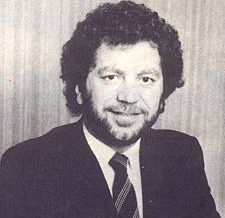
Alan
Sugar
He
is a donor to the British Labour
Party. In 2005 he stepped into the BBC TV series, The
Apprentice. The American
version of the show, starring entrepreneur Donald Trump, had
already proven popular in the USA.
He
was knighted
in 2000 for his contributions to business.
Amstrad
In
1968 he went on to found the electronics and computer company Amstrad
(the name being taken from his initials – Alan Michael
Sugar Trading).
By
1970 the first manufacturing venture was away. He achieved lower
production prices by using the injection moulding plastics for hi-fi
turntable covers, severely undercutting competitors who used the
vacuum forming process. Manufacturing capacity was soon expanded to
include the production of audio amplifiers and tuners.
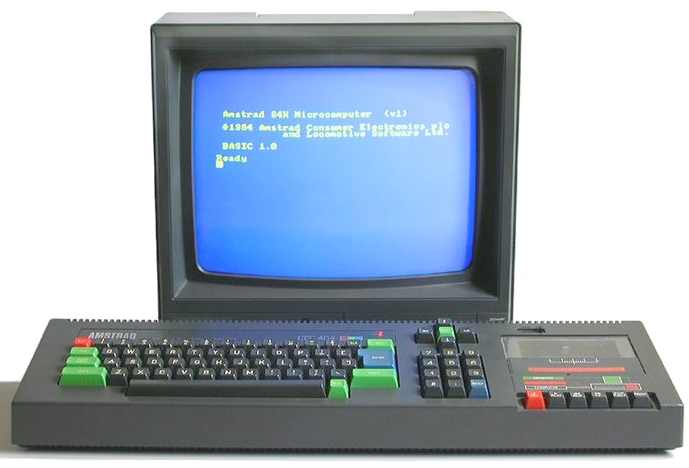
Amstrad's
CPC 464 Computer
In
1980 Amstrad was listed on the London
Stock Exchange. Amstrad as a company doubled in both profit and
market value every year throughout the 1980s. By 1984, realising the
oncoming opportunity of the computing era, Amstrad launched an 8-bit
machine Amstrad CPC 464. He then went on to controversially purchase
the football club Tottenham Hotspur. Although the CPC range were
colourful machines, with CP/M-capability and a good BASIC operating
system, it could never really compete to its archrival, the more
graphically complex Commodore 64 or the cheaply mass produced Sinclair
ZX spectrum, as a games machine. In 1985 Sugar had another major
breakthrough with the launch of the Amstrad PCW8256 word processor
which, although made of very cheap components, retailed at over £300.
It also developed Amstrad PC 1512, a PC clone, that was quite popular
in Europe at the time.
At
its peak, Amstrad achieved a stock market value of £1.2 billion, but
the 1990s proved a troubling time. The launch of a range of business
PCs was marred by unreliable hard disks, supplied by Seagate, causing
a very high number of customer returns. This caused great damage to
Amstrad's reputation in that market, from which it never quite
recovered. Some years later, Amstrad sued Seagate to the tune of $100
million for the lost revenue.
In
the early-1990s Amstrad began to focus on portable computers rather
than desktop computers. In 1990 Amstrad tried to enter the gaming
market with the Amstrad GX4000, but it was a commercial failure,
because it used 8-bit technology unlike the 16-bit Sega Megadrive and
Super Nintendo. In 1993 Amstrad released the PenPad, a PDA, also a
commercial failure. Amstrad was the only manufacturer producing
receiver boxes and dishes at the launch of Sky, and has continued to
manufacture set top boxes, including Sky's Sky+ box.
In
1997 Amstrad bought into Betacom and Viglen, as the company decided to
focus more on communications as opposed to computers. Amstrad released
the first of its combined telephony and e-mail devices, called the e-m@iler,
followed by the e-m@ilerplus in 2002.
Sir
Alan currently has a 28% share in Amstrad.
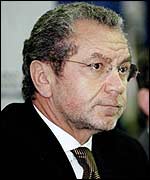
Sir
Alan - You're Fired
Amsair
Sugar
also controls Amsair Executive Aviation, founded in 1993 and run by
his son, Daniel Sugar. As with Amstrad, Amsair's name is taken from
his initials: Alan Michael Sugar
Air. Amsair is a British private aircraft charter
company that provides business
jet and executive jet charters. Amsair operates the UK's largest
fleet of Cessna Citation jets, as well as the Embraer Legacy. Through
its strategic alliances, including that with Blue Star Jets, the
world's largest broker of private aircraft, Amsair has access to over
5000 aircraft of all sizes.
Tottenham
Hotspur FC
Sugar
was once the chairman of Tottenham Hotspur F.C.. He and Terry Venables
got together to buy Tottenham Hotspur Football Club on 21 June 1991.
The pair beat off a late bid from Robert Maxwell for Spurs. In an
interview with Channel 4's High Interest programme, Alan Sugar
said:
"The
only dialogue I had with Rupert Murdoch was when that clown Maxwell
came on the scene and knowing that they were in the past arch
enemies I think Rupert rang me up one day and said 'what's going on
with this football club you're trying to buy and this clown Maxwell
is trying to buy also', and I think I might have said to him at the
time 'he's got the power of his newspaper to hype up the thing, I
haven't got a newspaper so perhaps one of your journalists could put
in a good word for me on The Sun, but that was about it"
A
Sun
headline once read: "20 things you never knew about Tel's Sugar
Daddy", which played on Sugar's financial contributions to Spurs
– paying off their £20 million debt and placing limits on players'
wages and other expenses – effectively saving the club from
administration. However, Sugar's relationship with Venables turned
acrimonious and court battles ensued. Sugar has stated that his time
at Spurs was "a waste of my life".
Sugar
sold most of his share in 2001, after several death threats towards
him and his family. He sold the shares to ENIC Sports Ltd, represented
by Daniel Levy – effectively the current chairman of the club. Sugar
currently has a 13% share of Spurs, making him the second-largest
shareholder.
Despite
owning a football
club, he once compared football players to thugs and suggested that if
they weren't playing professional football, most of them would be
imprisoned and notably threw Jurgen Klinsmann's shirt away in a TV
interview when the German striker refused to take up an option to stay
with the club for a second season.
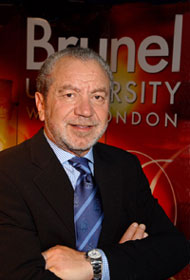
Brunel
University lecture
The
Apprentice
In
2005, Sir Alan became the star of the BBC reality show The
Apprentice, in which he had the job of the boss, as Donald Trump
had previously done in the US version. This meant that he dealt with
every "firing" of a certain candidate each week. Every week,
just the same as Donald Trump, he would eliminate one contestant by
telling them "You're fired", which became a popular
catchphrase in both the US and the UK. He also chose the tasks for the
teams, using his leads in the business world to get them tasks in
places such as Harrods
and Sir Alan's company, Amstrad. He also chose the rewards the winning
team received each week, which included dinner with Sir Alan, a trip
to Monaco and a trip on the Orient Express. He decided to continue his
role in the second series of The Apprentice, which is broadcasting now
on BBC2 on Wednesdays at 9pm. The series began in February, featuring
some new tasks & features, most are still to be found out, the
finals begin today. His second apprentice was chosen to be Michelle
over Ruth with a final task on the London Tower Bridge. He is also
scheduled to appear in a third series of The
Apprentice in 2007.
The Apprentice 2005, which has seen 14 candidates competing for a
job with the charismatic entrepreneur Sir Alan Sugar and a six-figure
salary, has been a ratings winner for the BBC. With the final episode
on Wednesday night, what have been the key lessons for success?
Despite
the success of The Apprentice, which has averaged 2.8 million viewers
a show, Sir Alan maintains it is "more business than
reality".
"It
is a business programme, but realistically, a lot of people will see
it as a reality programme because there's an elimination
process," he tells BBC News. "There is a very serious
underlying meaning to each programme - a lot of people are going to
learn some great business lessons from it."
Here
are some of those lessons:
In
week one, the contestants were split into two teams and given a few
hours to sell as many flowers as they could. The girls' team made the
least profit and therefore lost because, Sir Alan said, they were
trying to shine as individuals, "spending more time questioning
the leader than actually doing the selling".
KEY
LESSON: Authority must be respected. If individuals trying to
shine in a competitive situation do so at the expense of their
colleagues they will fail.
LISTEN
TO YOUR COLLEAGUES
The
teams had to create and pitch a prototype product to retail at £10 or
less for week two's task. Team leader Lindsay went against the wishes
of all five fellow members of the girls' team to choose her
"Secret Signals" idea over their plan for a toy robot. Her
idea - cards for children to make semaphore signals to each other -
was panned by a panel of experts who said it was redundant in the age
of texting and that they preferred the robot idea.
KEY
LESSON: "If a room full of people tell me I'm wrong then even
I will listen to them," Sir Alan said.
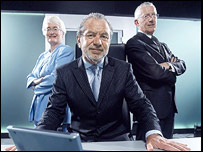
In
week four, the task given to the teams, which had by now been made
unisex, was to each run an area of the toy department in the Harrods
store, in London.
The
"First Forte" team, led by eventual finalist Tim, made
strong early sales after recruiting a face painter and giving toy
demonstrations to attract customers while the "Impact" team,
without any gimmicks, initially struggled. After consulting with the
store's own staff, a bear costume, donned by Paul, was unearthed which
proved extremely popular with children and parents and ultimately led
to a winning profit.
KEY
LESSON: When you're out in the field, keep an open mind, learn
from others and take action.
The
art gallery was the backdrop for week five's challenge with each team
trying to sell the work of a particular artist. First Forte again
looked like early favourites, selling piece after piece of
reasonably-priced artwork. But Impact's James, already something of an
expert in the field, realised there were likely to be some wealthy art
lovers at the gallery night and duly led his team to victory with the
sale of just two expensive pieces.
KEY
LESSON: Knowing your market gives you the upper hand.
In
week eight, the teams had to research, develop and manufacture food
products to sell at a farmers' market.
Impact
bought relatively expensive ingredients - including cheese and meat -
in an effort to produce a range of "quality" soups while
First Forte made chutney and jam at the suggestion of eventual
finalist Saira. First Forte, with cheaper ingredients, made a profit
of £364 while Impact made £149 and were shown pouring gallons of
unsold soup away. Sir Alan sacked Impact leader Ben for making the
"fatal error" of not controlling costs.
KEY
LESSON: Margin is king and the place to check for potential profit
is not in the day's takings but in the amount of wasted food.
In
the penultimate week, the remaining four candidates had to undergo
gruelling boardroom interviews to claim a place in the final two.
Saira was embarrassed by proclaiming "I hate liars" before
being caught out for "exaggerating" her CV. Paul claimed to
have a £3m property portfolio but stalled when asked about his
mortgages and was subsequently fired.
KEY
LESSON: As a candidate, never try to be someone you are not - you
may well get caught out.
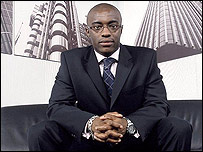
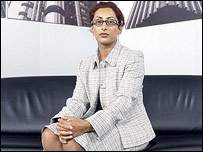
Tim
Campbell became Sir Alan's apprentice - Saira Khan made it to finals
Other
TV
Sir
Alan's increase in popularity has lead to him appearing in several
television shows, including a special celebrity edition of Who
Wants to be a Millionaire?. In 2005/6 he became the face of
Premium Bonds on British television advertisements. He also appeared
on Room 101 in 2005 and also on Friday Night with Jonathan Ross
in April 2006.
Further
reading
-
David
Thomas, "Alan Sugar - the Amstrad Story" (1991),
paperback ISBN 0330319000.
-
Alan
Sugar, "The Apprentice: How to get hired not fired"
LINKS
and REFERENCE:
You're
hired' - success is sweet for Michelle as Sugar's new
Scotsman, United Kingdom
And victory on BBC2's The Apprentice finally
went to blonde former checkout girl ... Ruth Badger to clinch a
£100,000 job with Amstrad tycoon Sir Alan Sugar. ...
Sir
Alan Sugar To Tap His Apprentice In BBC Finale
Forbes
Michelle,
you're hired - Sugar says Guardian Unlimited
Sugar's
big £100,000 job decision expressandstar.com
Glasgow
Daily Record - Daily
Mail - UK
Point
is, Sugar's path isn't sweet
Scotsman, United Kingdom - 12 hours
ago
... The contestants in The Apprentice
don't require an entry into the public world, as most ... at
the feet of a respected mentor - what they want from Alan Sugar
is a ...
Sir
Alan Sugar - you're fired ic Wales
DEATH
OF CV LEAVING BUSINESSES AT RISK, EXPERTS WARN SourceWire
(press release)
Bitter
taste of Sugar for Apprentice's Paul
Yorkshire Post Today, UK - May 4, 2006
... but after falling at the final hurdle Paul
Tulip talks to Sarah Freeman about Big Issue sellers and who he thinks
will be Sir Alan Sugar's next Apprentice. ...
Da
Vinci Code - you're fired!
The Sunday Times, UK - 18 minutes ago
... authoritative jungle shorts. Or listen to
Sir Alan Sugar as he enjoys a God-like status in the
boardroom of The Apprentice. To be shown ...
UK
infested with bad managers
Management-Issues, UK - 13 hours ago
... Sir Alan Sugar is certainly
not held up as a role model for UK bosses ... they would not
work for the acerbic entrepreneur and star of BBC2's 'The Apprentice'.
...
What
does Amstrad actually do?
Guardian Unlimited, UK - 22 hours ago
Paul Tulip, one suspects, didn't really want to work
for gruff old sir Alan Sugar at Amstrad - and who can
blame him? The Apprentice contestant, who said of ...
Celebrities
in the firing line for Comic Relief Apprentice
Guardian Unlimited, UK - 13 hours ago
BBC1 is planning a celebrity version of The Apprentice,
fronted by Sir Alan Sugar, in aid of Comic Relief. It
will be the first ...
Sir
Alan's Sugar Babes
International News Service, Australia - May
7, 2006
... DAVID THOMAS meets the two finalists in the
catfight to land a Pounds 100k job. Sir Alan Sugar is
about to pick his next Apprentice. ...
CV
should be where firms start
ic Huddersfield.co.uk, UK - 12 hours
ago
... The research was conducted after last
week's episode of The Apprentice, during which ... The
26-year-old was told "You're fired" by Alan Sugar
after admitting his ...
Finding
the message for trading places
ic Wales, United Kingdom - 11 hours
ago
I AM sure, that like me, many of you will be glued to
the final episode of The Apprentice, tonight to see which of Alan
Sugar's babes is to win the coveted
A
taste for adventure capitalists

Solar
Cola - the healthier cola alternative
This
material and any views expressed herein are provided for information
purposes only and should not be construed in any way as a prospectus
or offer. Please contact the company concerned for information of
any business opportunity or specific program. Before investing in
any business, you must obtain, read and examine thoroughly its
disclosure document or offering memorandum.
|






